Russia’s Defence Minister Touring Caribbean Triangle
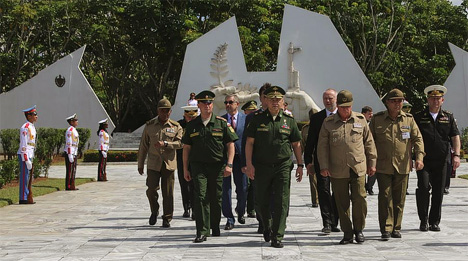
It was seen in Caracas, Managua and Habana and Latin America in general as a manifestation of solidarity. It could not have been otherwise under the conditions when the United States exerts permanent pressure on Latin America, intensifies subversive actions to kindle «color revolutions» and overthrow legal governments. The leaders of Venezuela, Nicaragua and Cuba often say the US uses the whole arsenal of clandestine wars: from information warfare to creating terrorist cells and plots aimed at physical elimination of people with the leaders of the countries fallen out of favor with Washington as the prime targets.
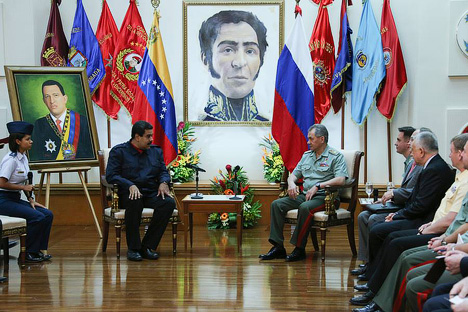
The Shoigu’s visit to Caracas coincided with the disclosure of anti-government conspiracy in the ranks of Venezuelan Air Force. Acting and retired officers planned to attack the main targets in the capital: the Miraflores presidential palace, the buildings of Ministry of Defense, the Security Service (Sebin), Ministry of Foreign Affairs and General Prosecutor’s Office. The conspirators wanted to use a Tucano-class plane, an agile aircraft designed to fight guerilla forces. It was to take off from Curaçao Island or Aruba where US forward operating locations (FOLs) are deployed and the CIA conducts intensive activities. The attack was scheduled to take place at the time the country’s radical opposition planned to stage manifestations to enable its leaders take advantage of chaos in the country and grab power. This time the strategy of «managed chaos» failed. The military remains loyal to the Bolivarian regime which enjoys strong social support.
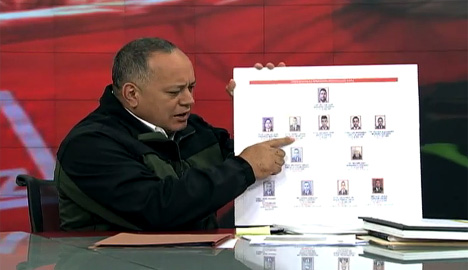
Under the circumstances the stabilizing effect of the Shoigu’s visit was obvious: the Minister demonstrated that Moscow had no doubts that President Maduro’s position was strong and Venezuela remained to be a reliable strategic partner in the Caribbean region. Russia does its best applying efforts to boost the defense potential of Venezuela and other allies in the Caribbean region. It will continue to do so. Western media outlets called the Russian Minister’s Latin American tour «an act of diplomatic pressure on the United States», no matter Shoigu never said anything to support this affirmation during the trip. Moscow constantly emphasizes that the bilateral military cooperation with its partners is never targeted against other countries. No matter the Russian Defense Chief did not say anything on this account; the fact of military cooperation is interpreted by Western media as a sign of political pressure on the United States. They talk about «pressure’ at the time the US unleashed an intensive propaganda campaign in support of supplying lethal arms to Ukraine. Such actions cannot but make Moscow oppose the move. The West has to clearly understand that.
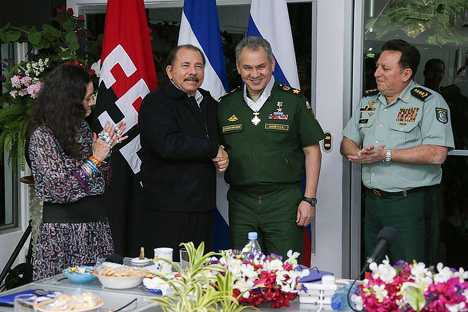
In Managua, another stop on the way, the Minister signed an intergovernmental agreement on a simplified procedure of Russian Navy warships’ visits to the ports of Nicaragua and a number of other documents in the sphere of military-technical cooperation. During a visit to Nicaragua, the Russian Defense Minister opened a topographical center; its equipment was supplied and installed by Russian specialists.
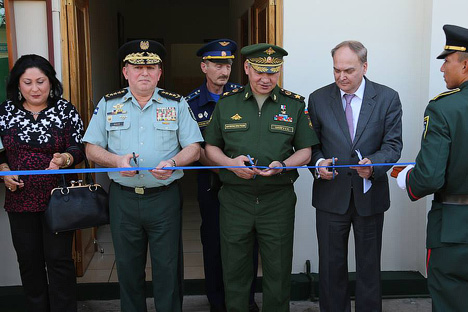
Experts emphasize the tangible increase of Russia’s presence in the country, especially the plans to build the Nicaraguan Canal, another route connecting the Atlantic and the Pacific besides the US-controlled interoceanic connection. China is to carry out the bulk of work. According to media reports, Russia will be responsible for the grand canal’s protection. No way will the United States stay aside. The Sandinista government should remain as vigilant as it can be.
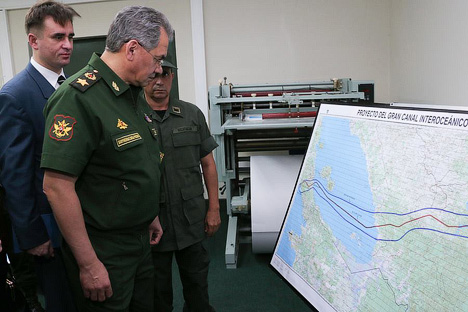
President Daniel Ortega used the Shoigu’s visit as an occasion to speak out his views on current international events. To his mind, the United States’ activities are the main reason for the world economic crisis hurting the US itself, as well as Europe. Ortega supported Russia in its efforts to peacefully settle the crisis in Ukraine. According to him, the West is responsible for the degradation of this country. He said, «We all could see TV live reports on outrageous marches of fascists ending up in a coup. We expect the new proposals put forward by the Russian Federation and President Putin to serve as a basis for restoring peace in the region».
The Shoigu’s trip was timely. The US administration has come up with initiatives aimed at rapprochement with Havana. The time is right to clearly define the real goals pursued by the United States and the threats facing the «socialism with a human face» and the future of Russia-Cuba relations.
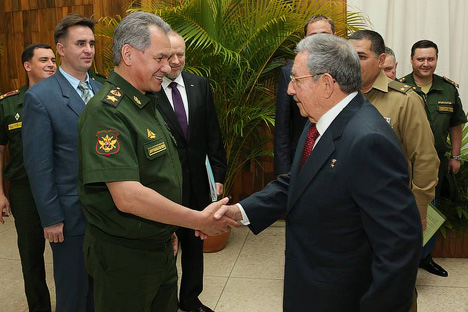
Fidel Castro said Cubans still don’t trust the United States and will adhere to the policies pursuing their own interests. These words provide a clue to understanding of Havana’s approach to US-Cuba dialogue. The underlying message is the same: there is a threat of being stricken from behind by the «fifth column» fostered by the CIA with the help of non-government organizations, hired bloggers and intensive «anti-Castro» propaganda. Experts believe that the United States is rallying the Cuban dissidents to stage a coup on the island. But Cuban leadership has accumulated rich experience of countering the subversive activities conducted by US special services.
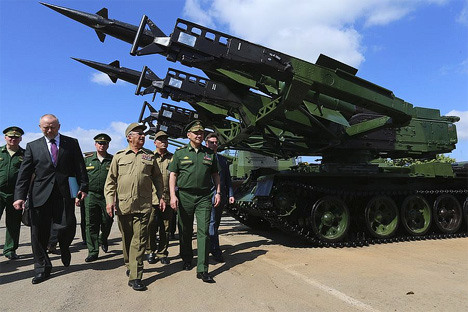
No doubt, the Russia’s Defence Minister’ visit gave a new impetus to the development of Russia-Cuba military cooperation. In Havana the agenda included many issues and a lot of details remained outside the reach of press. It’s important to note that the range of issues discussed included the deliveries of new weapons systems, the modernization of obsolete inventory supplied in the days of the USSR and training of Cuban personnel in Russian military academies. Meeting Raul Castro, the Cuban President of the Council of State and the President of the Council of Ministers, Shoigu emphasized that the progress in development of military ties was in full swing. The Defense Minister added that Russia and Cuba are also developing cooperation in the military and technical spheres. "We are grateful to Cuba for receiving Russian Navy ships in Havana. Russia is interested in expanding naval cooperation," Shoigu said, also thanking Castro for the warm welcome of the Russian delegation in Cuba. Raul Castro highly appreciated the military cooperation with Russia. He said that this year Cuban crews will take part in tank biathlon competitions to be held in Russia as well as international army games, the military-technical forum "Army-2015", which is planned to be held from 16 to 19 June of the current year, and the annual international security conference.
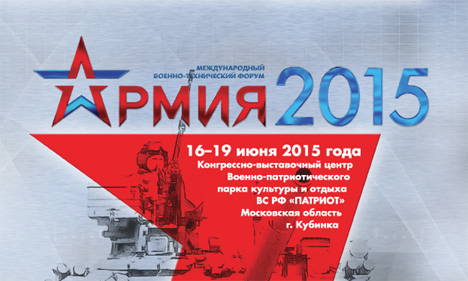
The Caribbean coastline includes the territories of Mexico, Central America and the northern part of South America. It has always been considered by the United States as an internal lake. But the times are changing. No matter all the words said by Obama about the American exceptionalism and its global leadership in the current century, the United States cannot maintain the status quo. The presence of China, Russia and Brazil is felt more strongly. This is a trend. The Caribbean states, as well as the entire Latin America, shift to alternative poles of power. The United States trying to assert its leadership with the help of bombings, state terrorism, bloodshed and tortures is perceived as a Moloch of war hostile to humanity.